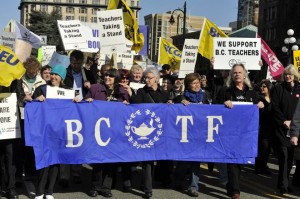BCTF New Release, January 8, 2014– Data on BC’s education system released by the government shows our province’s class composition is worse than ever before, said BCTF President Jim Iker. There are over 16,000 classes with four or more children with special needs.
“BC teachers fully support including all students, like those with special needs, in our classrooms, but 12 years of cutbacks have meant those kids are not getting the support they need,” said Iker. “Ever since the BC Liberal government stripped our collective agreement in 2002, learning conditions for all students have deteriorated. We see the results today because more teachers than ever before are dealing with overly complex classrooms without the support of specialist teachers to support students.”
The data released by the Ministry of Education shows there are 16,163 classes with four or more students with special needs. That represents one in four of all classes in BC. In addition, a staggering 3,875 classes have seven or more children with special needs in them. The data also highlights concerns with the support available for English Language Learners (ELL) formerly known as ESL in BC. There are 4,636 classes with seven or more English Language Learners (ELL). Within that total are 1,956 Kindergarten to Grade 3 classes with seven or more English Language Learners.
“Class composition is one of the most important aspects in education,” said Iker. “An overly complex class puts immense pressure on the teacher to meet the needs of all students. As teachers, we fully support and embrace diversity in learning styles and needs in our classrooms, but we can only do so much without extra support before students lose out.”
Iker also pointed out that the worsening of class composition year-over-year has coincided with dramatic cuts to learning specialist teachers. For example, since 2002 BC has lost approximately 700 special education teachers and over 300 English Language Learner teachers. Furthermore, BC has the worst student-educator ratio in Canada and funds education $1,000 less per student than the national average.
“BC teachers are among the best in the world, but this government is making it harder for them to do their jobs and harder for students to get the education they deserve,” said Iker. “It’s time for government to step up, correct their past mistakes, and address BC’s worsening class composition.”
Click here to view the Class composition chart.

 Follow
Follow
